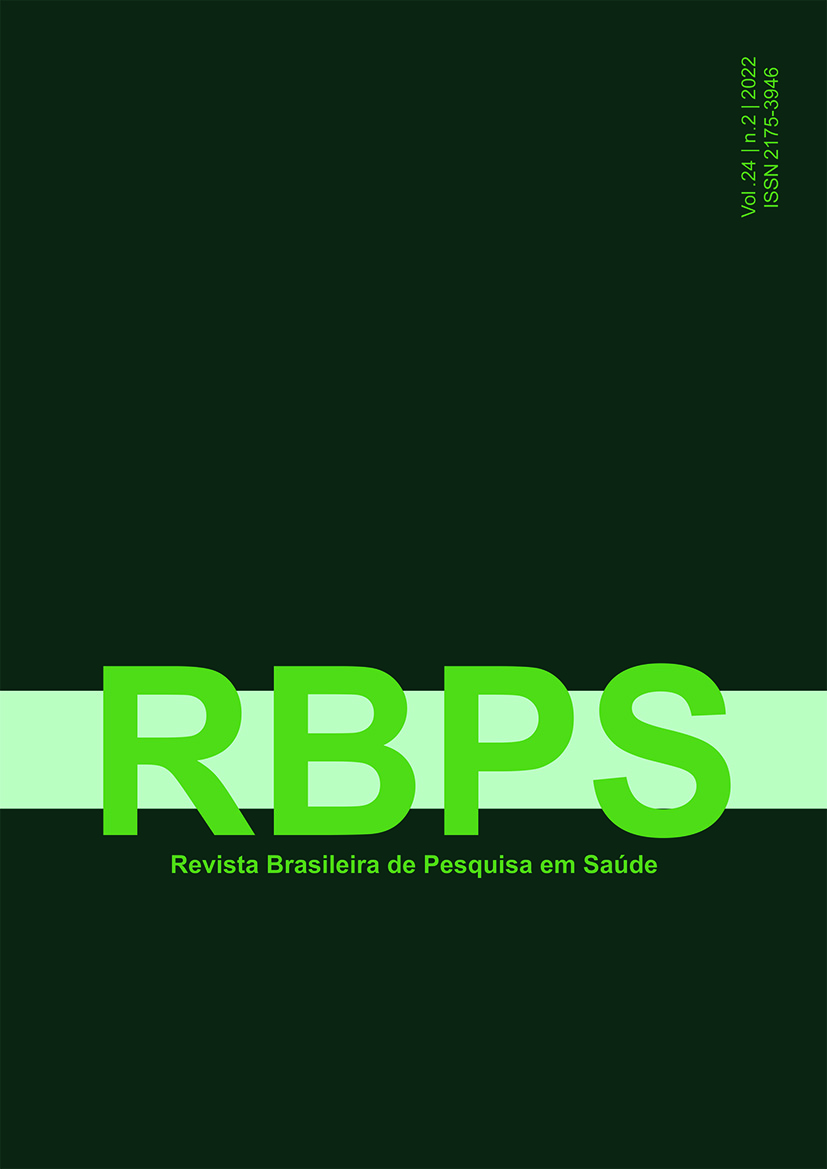Cannabis, legal-illegal drug: interrelationships in the border area from the experiences of users
DOI:
https://doi.org/10.47456/rbps.v24i2.37102Keywords:
Cannabis, Frontier area, Brazil, Uruguay, Smoke weed, Qualitative researchAbstract
Introduction:
Cannabis is a psychoactive substance (PAS) used worldwide on a large scale. Objective: To understand the interrelationships of Brazilian and Uruguayan drug policy on Cannabis use in border areas. Methods: Study with a qualitative, exploratory and descriptive approach. Fourteen people who use Cannabis residing in a Brazil/Uruguay border city were interviewed. Data were collected through semi-structured interviews, through thematic analysis. Results: The interrelationships of Brazilian law with Cannabis consumption originate from the norms of the prohibitionist policy, which generated drug trafficking; space of violence, offer of adulterated Cannabis, work by children and adolescents in the illegal trade; misuse and perpetuation of social stigma. The interrelationships with the Uruguayan drug policy, on the other hand, allow the use of Cannabis with different characteristics and qualities; the existence of illegal Cannabis trade in Uruguay exposes Brazilian consumers to the risk of legal sanctions. Conclusion: Considering the ineffectiveness of the prohibitionist model and the implementation of new public policies on drugs in several countries, it is relevant to monitor territories that intersect different perspectives, in order to envision social and health changes.
Downloads
References
Junior RT. Maconha na guerra às drogas: (in) constitucionalidade e (in) convencionalidade. Rev. Dir. Liberdad [internet]. 2017 [acesso em: 25 nov. 2021]; 19(1): 227-61. Disponível em: http://www.esmarn.tjrn.jus.br/ revistas/index.php/revista_direito_e_liberdade/article/ view/1479
Oficina de la naciones unidas contra la droga y el delito ‘’UNODC’’, conclusiones y consecuencias en materia de políticas [internet]. 2018 [acesso em: 25 nov. 2021]. Disponível em: https://www.unodc.org/wdr2018/ prelaunch/WDR18_ExSum_Spanish.pdf
Brasil. Lei nº 11.343, de 23 de agosto de 2006. Institui o Sistema Nacional de Políticas Públicas sobre Drogas - Sisnad [internet]. 2006 [acesso em: 25 nov. 2021]. Disponível em: http://www.planalto.gov.br/ccivil_03/_ ato2004-2006/2006/lei/l11343.htm
Uruguay. Presidencia de la República Oriental del Uruguay. Lei 19.172 Instituto de Regulação e Regulação de Cannabis do Uruguai (IRCCA) [internet]. 2013 [acesso em: 25 nov. 2021]. Disponível em: http://www.ircca.gub. uy/wp-content/uploads/2017/01/Ley_19172.pdf
Rosa PO, Rosa MG. Políticas sobre Cannabis: um estudo comparado sobre os modelos da Espanha, Uruguai e Colorado/EUA. Geographia Opportuno Tempore [internet]. 2018 [acesso em: 25 nov. 2021]; 4(1): 38-64. Disponível em: file:///C:/Users/jessi/Downloads/32548- 155823-1-PB%20(4).pdf
Tavares D, Franchini B, Biondi H, Jardim V, Rodrigues C, Camargo P. Rituais de consumo de “cannabis” por usuários na fronteira entre o Brasil e o Uruguai. Rev Enferm UFSM [internet]. 2019 [acesso em: 25 nov. 2021];9:e33. Disponível em: https://doi.org/10.5902/2179769230956
Cardano M. Manual de Pesquisa Qualitativa: a contribuição da teoria da argumentação. Vozes. Petrópolis: RJ, 2017.
Goodman LA. Snowball sampling. In: Annals of Mathematical Statistics. [internet]. 1961 [acesso em: 25 nov. 2021];(32):148-70. Disponível em: https://doi. org/10.1214/aoms/1177705148
Mynaio MC. Amostragem e saturação em pesquisa qualitativa: consensos e controvérsias. Rev. Pesq. Quali [Internet]. 2017 [acesso em 25 nov 2021]; 5(7):1-12. Disponível em: https://editora.sepq.org.br/rpq/article/ view/82/59
Braun V, Clark V. Reflecting on reflexive thematic analysis. Qual Res Sport Exerc Health [internet]. 2019 [acesso em: 25 nov. 2021];11(4):589-97. Disponível em: https://doi.org/10.1080/2159676X.2019.1628806
Braun V, Clark V. Using thematic analysis in psychology. Qual Res Psychol. [internet] 2006 [acesso em: 25 nov. 2021];3(2):77-101. Disponível em: https://doi. org/10.1191/1478088706qp063oa
Brasil. Ministério da Saúde. Conselho Nacional de Saúde. Resolução n° 466/12: sobre pesquisa envolvendo seres humanos. Ministério da Saúde [internet]. 2012 [acesso em: 25 nov. 2021]. Disponível em: http://conselho. saude.gov.br/resolucoes/2012/Reso466.pdf
Gonçalves HS. Sobre a morte, sobre a vida: a produção da bíos em adolescentes em conflito com a lei. Rev Polis Psique. [internet]. 2016 [acesso em: 25 nov. 2021]; 6(1):65- 84. Disponível em: https://doi.org/10.22456/2238- 152X.61382
Silva JL, Parrão JA. Adolescentes no tráfico: cruel realidade e uma das piores formas de se explorar a mão de obra infantil. Encontro de iniciação científica [internet]. 2017 [acesso em: 25 nov. 2021];13(13):1-18. Disponível em: http://intertemas.toledoprudente.edu.br/index.php/ ETIC/article/view/6226/5929
Galdeano AP, et al. Tráfico de drogas entre as piores formas de trabalho infantil: mercados, famílias e rede de proteção social. NEU - Núcleo de Etnografias Urbanas. São Paulo: CEBRAP. [internet]. 2018 [acesso em: 25 nov. 2021];1-134. Disponível em: https://cebrap.org.br/wp-content/uploads/2018/11/Tr%C3%A1fico-de-Drogas- Trabalho-Infantil_ebook.pdf
Souza TS, Silva AL. Guerra às drogas: a lógica econômica da proibição. Rev Dep de Ciênc Soc [internet]. 2018. [acesso em: 25 nov 2021];1(1):221-41. Disponível em: https://doi.org/10.5752/P.2595-7716.2018v1n1p221-241
Alcântara LT. Adulterantes encontrados em drogas ilícitas: uma abordagem forense. Acta Ciênc Saúd [internet]. 2016 [acesso em: 25 nov. 2021];5(2):1-16. Disponível em: http://www2.ls.edu.br/actacs/index.php/ACTA/article/ view/129/120
Pereira JR, Sousa CV, Shigaki HB, Lara JE. Cannabis sativa: aspectos relacionados ao consumo de maconha no contexto brasileiro. Rev Adm Hosp Inov em Saúd. [internet] 2018 [acesso em: 25 nov. 2021];15(1). Disponível em: https://doi.org/10.21450/rahis.v15i1.4573
Moreno MP. Adulteração, contaminação e concentração de princípios psicoativos da resina de cannabis consumida na Comunidade de Madrid. [Tese] Universidade Complutense de Madrid, Faculdade de Medicina Veterinária, Departamento de Anatomia e Embriologia, 2019.
Lopes CS, Ribeiro EA, Tordoro MA. Direitos humanos e cultura policial na Polícia Militar do Estado do Paraná. Sociologias. [internet]. 2016 [acesso em: 25 nov. 2021]; 18(41):320-53. Disponível em: https://doi. org/10.1590/15174522-018004122
Souza JS, Vilela SC, Costa AC, Silva SI. Política, segurança e saúde pública no Brasil: combatendo a violência. Rev Enferm UFPE [internet]. 2020, 2016 [acesso em: 25 nov. 2021];14:e244226. Disponível em: https:// doi.org/10.5205/1981-8963.2020.244226
Brasil. Departamento Penitenciário Nacional. Levantamento Nacional de Informações Penitenciárias - Infopen, dezembro, 2019 [internet]. 2020 [acesso em: 25 nov. 2021]. Disponível em: http://antigo.depen.gov.br/ DEPEN/depen/sisdepen/infopen
Elsohly MA, Mehmedic Z, Foster S, Gon C, Chandra S, Church JC. Changes in Cannabis potency over the last 2 decades (1995-2014): analysis of current data in the United States. Biol Psychiatr [internet]. 2016 [acesso em: 25 nov. 2021];79(7):613-19. Disponível em: https://doi. org/10.1016/j.biopsych.2016.01.004
Bitencourt NF. Drogas nas forças armadas, perfil do usuário e persecução criminal: a questão da inconvencionalidade do artigo 290 do Código Penal Militar. Rev. Defensoria Púb. União [internet]. 2017 [acesso em: 25 nov. 2021];(10):1-504. Disponível em: https://revistadadpu.dpu.def.br/index.php/revistadadpu/ article/view/36/26
Gomes-Medeiros D, Faria PH, Campos GW, Tófoli LF. Política de drogas e saúde coletiva: diálogos necessários. Cad. Saúde Pública [internet]. 2019 [acesso em: 25 nov. 2021];35(7):e00242618. Disponível em: https://doi. org/10.1590/0102-311x00242618
Downloads
Published
How to Cite
Issue
Section
License
Copyright (c) 2022 Brazilian Journal of Health Research

This work is licensed under a Creative Commons Attribution-NonCommercial-NoDerivatives 4.0 International License.
Authors and reviewers must disclose any financial, professional, or personal conflicts of interest that could influence the results or interpretations of the work. This information will be treated confidentially and disclosed only as necessary to ensure transparency and impartiality in the publication process.
Copyright
RBPS adheres to the CC-BY-NC 4.0 license, meaning authors retain copyright of their work submitted to the journal.
- Originality Declaration: Authors must declare that their submission is original, has not been previously published, and is not under review elsewhere.
- Publication Rights: Upon submission, authors grant RBPS the exclusive right of first publication, subject to peer review.
- Additional Agreements: Authors may enter into non-exclusive agreements for the distribution of the RBPS-published version (e.g., in institutional repositories or as book chapters), provided the original authorship and publication by RBPS are acknowledged.
Authors are encouraged to share their work online (e.g., institutional repositories or personal websites) after initial publication in RBPS, with appropriate citation of authorship and original publication.
Under the CC-BY-NC 4.0 license, readers have the rights to:
- Share: Copy and redistribute the material in any medium or format.
- Adapt: Remix, transform, and build upon the material.
These rights cannot be revoked, provided the following terms are met:
- Attribution: Proper credit must be given, a link to the license provided, and any changes clearly indicated.
- Non-Commercial: The material cannot be used for commercial purposes.
- No Additional Restrictions: No legal or technological measures may be applied to restrict others from doing anything the license permits.

























